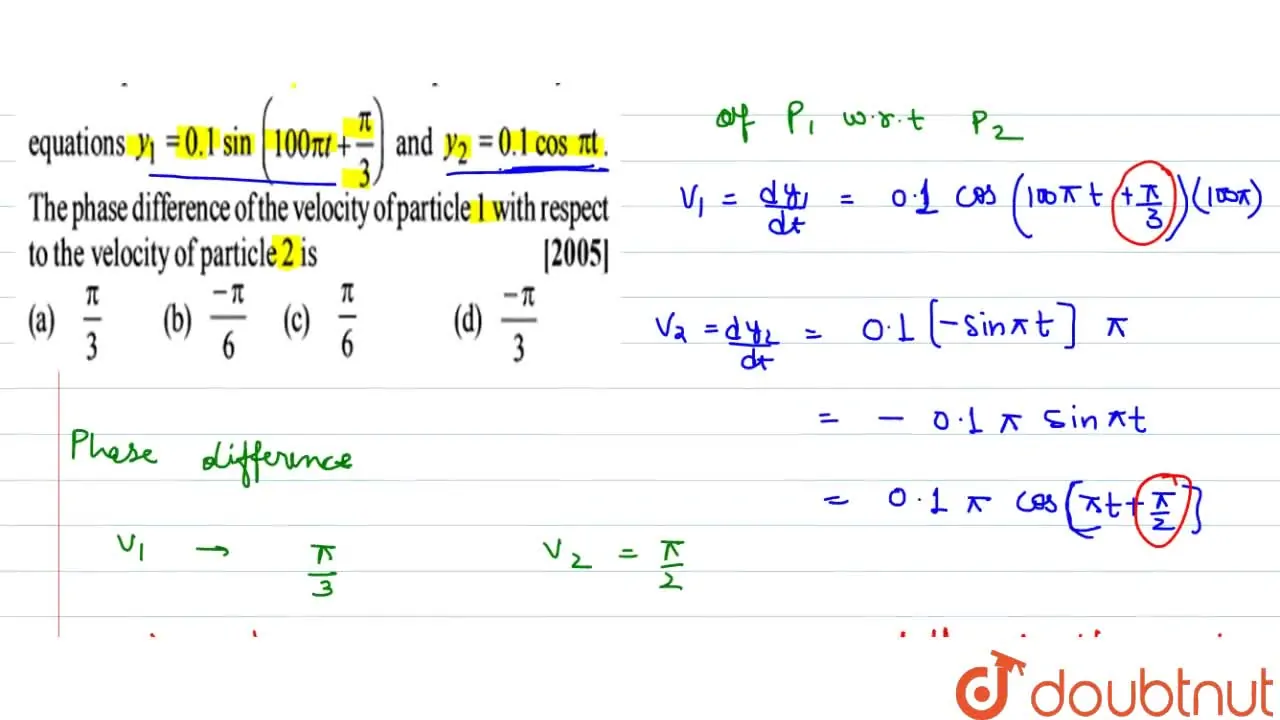Two simple harmonic are represented by the equation y1=0.1sin(100π+π3)andy2=0.1cosπt.
The phase difference of the velocity of particle 1 with respect to the velocity of particle 2 is.
At time t=0,
Velocity of particle 1 is
v1=dy1dt=0.1cos(100πt+π/3)×100π
=10πcos(100πt+π/3)
Velocity of particle 2 is
v2=dy2dt=0.1(−sinπt)π=−0.1πsinπt
=0.1π[cos(πt+π/2)]
At time t=0,
Phase of velocity of particle 1,
ϕ1=(100π×0+π/3)=(π/3)
Phase of velocity of particle 2,
ϕ2=(100π×0+π/3)=(π/2)
Phase differecne of velocity of particle 1 w.r.t. velocity of particle 2 at time t=0
=ϕ1−ϕ2=(π/3)−(π/2)=−π/6
Related Playlists
- BOOK - PRADEEPCHAPTER - OSCILLATIONS AND WAVESEXERCISE - Very Short Answer Questions99videos
OSCILLATIONS AND WAVES
- BOOK - PRADEEPCHAPTER - OSCILLATIONS AND WAVESEXERCISE - Short Answer Questions104videos
OSCILLATIONS AND WAVES
- BOOK - PRADEEPCHAPTER - OSCILLATIONS AND WAVESEXERCISE - SOLVED EXAMPLES54videos
OSCILLATIONS AND WAVES
- BOOK - PRADEEPCHAPTER - MATHEMATICAL TOOLSEXERCISE - Fill in the blanks5videos
MATHEMATICAL TOOLS
- BOOK - PRADEEPCHAPTER - PHYSICAL WORLD AND MEASUREMENTEXERCISE - Competiton Focus Jee Medical Entrance18videos
PHYSICAL WORLD AND MEASUREMENT
Similar Questions
Two simple harmonic motions are represented by the equations y1=0.1sin(100πt+π3) and y1=0.1cosπt. The phase difference of velocity of particle 1 with respect to the velocity of particle 2 at time t = 0 is
View SolutionTwo simple harmonic motion are represented by equations
y1=4sin(10t+ϕ)
y2=5cos10t
What is the phase difference between their velocities ?View SolutionTwo simple harmonic motions are represented by y1=10sinωt and y2=15cosωt. The phase difference between them is
View SolutionTwo simple harmonic motions are represented by the equations y1=2(√3cos3πt+sin3πt) and y2=3sin(6πt+π6)
View SolutionTwo simple harmonic motions are represented by y1=4sin(4πt+π/2) and y2=3cos(4πt). The resultant amplitude is
View SolutionThe simple harmonic motions are represented by the equations:
y1=10sin(π4)(12t+1),y2=5(sin3πt+√3))View SolutionTwo simple harmonic motions are represented by the equations
y1=10sin(3πt+π/4)andy2=5(sin3πt+√3cos3πt) their amplitude are in the ratio of ………… .View SolutionTwo simple harmonic motions are represented by the equations y1=10sin(3πt+π4)
and y2=5(3sin3πt+√3cos3πt). Their amplitudes are in the ratio ofView SolutionThe simple harmonic vibrations of two particles are y1=5sin(100t)andy2=4cos(100t+π4). The phase difference between both particles is
View SolutionThe displacement of two particles executing SHM are represented by equations, y1=2sin(10t+θ),y2=3cos10t. The phase difference between the velocity of these particles is
View Solution


